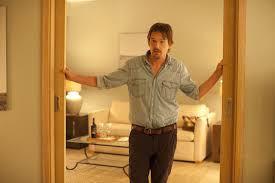Reviewer’s note: I’ve worked very hard to avoid revealing any specific plot points beyond the film’s opening scenes, because I think the film’s dialog works best when heard without familiarity.
Early on in Richard Linklater’s brilliant, funny, lacerating new film, Before Midnight, Jessie (Ethan Hawke) discusses the plans for his new novel featuring various characters suffering from assorted mental disorders, struggling to understand and accept the world around them, stating, “it’s not time their lost in. It’s perception.”

“Stop looking at me like I’m pretentious. You know I’m just one of the guys.”
Jessie stresses that distinction as though it’s something significant. However, if Before Midnight proves anything, it proves much of our characters’ sufferings stem from the uneasy co-mingling of time and perception. Both abstract concepts work in tandem, congealing into one ominous, threatening force for our main characters. Jessie and Celine (Julie Delpy), eighteen years removed from those two, youthful, optimistic versions of themselves who met on a Budapest train in Before Sunrise, find their perceptions of themselves and the lives they have created together altered by time’s inevitable passing and the alterations in perception that can accompany long-term familiarity.

Like sands through the hourglass…
The film opens with Jessie dropping his teenage son off at the airport for a flight back to his home in Chicago, where he lives with Jessie’s ex-wife. Jessie holds lingering guilt over his physical distance from his son, that he has grown up without a regular, fatherly presence and that now Jessie is no longer as necessary to his son’s life as he once was. Instead, Jessie lives in Paris with Celine and their twin daughters, and they have been together since Before Sunset’s final moments. Both are now in their 40s and are at that painful point when their lives seem both appealingly routine and callously mundane. Celine has become dissatisfied with her work and is contemplating a government job, while Jessie continues to find success as a writer, but both seem happy and content with their lives. Their first scene features the same playful, affectionate dialog we have come to expect from these two charming, exasperatingly, articulate individuals. They seem older, less lively, and more tinged with regrets than in previous films, but there’s still an inherent sweetness to the way that laugh and tease one another. Watching their first scene, I felt an involuntary smile cross my face.

“Isn’t it amazing we’re still this charming, eighteen years later?”
I love these characters and seeing them here feels like reuniting with wonderful old friends you always hope to see more often but tragically never do.
Spending their summer in Greece, they have dinner with a young, happily in love couple, who serve as a poignant reminder of the romance they used to have and a subtle illustration of what their lives have lost. There are subtle clues that all is not as right between Jessie and Celine as appears on the surface, but they’re keeping their anger underwraps in front of company. Then they are given a night in a hotel by friends, with the promise they’ll rekindle the romance they’ve been giving short shrift lately.

“Check it out. We’re still kinda happy at this point of the film.” Yeah, it’s not gonna last.
They spend the first half of their evening alone (clearly the first evening alone they’ve had in a long time), continuing the same conversation they began in Before Sunrise and restarted in Before Sunset. What follows is a series of conversations, like the two films that precede Before Midnight, that begins lightly and playfully but descend into mutual soul bearings. However, bit by bit, the playful jokes and wistful musings reveal cracks in their peaceful, blissful relationship. As the conversations turn more and more painfully intimate, the viewer begins to feel like a twisted voyeur peering in, uninvited, on a couple’s private interactions. We’re watching a marriage implode before our eyes, in a manner so achingly real it becomes both difficult to continue watching the screen and impossible to look away.
The film’s first half is an exquisite blend of romance, with a melancholic undercurrent stemming from the mere knowledge that Jessie and Celine have aged. Mortality feels more palpable now, for if they are eighteen years older, then so are we all, but the film’s characters still appear to feel mostly at peace. It is not until the second half, when long buried angers and resentments bubble to the surface and reveal themselves through a series of cruel remarks and bitter accusations that the film’s true power become apparent. The first half slowly reveals the hairline cracks in their romantic ecstasy. The second half digs and scratches at those fissures until they are deep, possibly insurmountable, crevices.

“I think I see where you and Uma went wrong.”
Throughout every vicious, ferocious barb, what remains most lamentably clear is the still obvious love Jessie and Celine have for each other. Before Midnight poses the cruelest of human truths: maybe loving someone isn’t enough to keep a relationship afloat. Neither individual is obviously right nor wrong in their claims against the other. In fact, both viewpoints seemed filled withpetty angers and legitimate critiques. The most difficult arguments are always those that hold no obvious “right” answer, and Jessie’s and Celine’s issues feel all the more poignant, because they lack easy solutions.
Richard Linklater’s brilliant direction is deceptively simple and wonderfully effective, simply tracking Jessie’s and Celine’s interactions with one another using a non-judgmental, unobtrusive eye. He presents the Grecian landscape as lush and welcoming, and the pivotal hotel room in which much of the film’s second half takes place as a setting that first feels welcoming and romantic but transforms into an oppressive, claustrophobic location as the film stretches on.

“Heeeere’s Jessie!” Thank God he doesn’t have an axe.
Hawke and Delpy, who collaborated on the screenplay, wear their characters like second skins. Jessie and Celine have been allowed to age and evolve along with the actors who infuse them with life and vitality, and they are both perfection in their roles. Hawke’s face may appear more gaunt, that wrinkle down the center of his T-zone more prominent and Delpy’s eyes may appear more tired and her figure fuller that in the previous films, but these physical alterations make their interactions more poignant. They’re not beautiful twenty-somethings anymore.

You guys just wish you looked even one-tenth as gorgeous as we do.
They’ve aged, even if they are still better looking than most of us, and that simple aging process makes their interactions feel truer and more intimate. There’s a lovely moment in which the two of them sit, watching a sunset, noting they can still see it until it finally disappears behind the landscape. When it has finally faded from view, there’s a lovely bit of silent acting between the two, as they look briefly pleased, then become more pensive and somber, as they realize perhaps the sun is setting on their life together as well. Both seem to realize something has been lost between them, and both appear to doubt whether or not it is something they can reclaim. It’s a moment of perfect foreshadowing for the later events in the narrative.
I’d love to pinpoint some little issue I had with the film, but here, writing this review, I can’t think of anything. The film is near flawless and is the best film I’ve seen so far this year. In a summer of spectacle over substance, it’s so refreshing to see a film without CGI, superheroes, or space ships. The movie takes it as a given that two individuals carrying out conversations will hold an audience’s attention, and the film proves that theory correct without fail.
It’s startling to realize that this unplanned trilogy, full of little more than rambling conversations, intimate confessions and slow strolls through exotic locales, has become the epic romance of a generation, one of the few epic romances that have allowed its characters to age with its audience. The viewer feels instant affection towards this couple, because we’ve known them for eighteen years. Our relationship with them has outlasted some real-world marriages, so the film has little to do in order to ensure we root for them to reconcile, understand the gravity of their complaints, and wince at the potentially irreparable damage they are doing to their relationship. As a viewer, we are actively rooting against every last, brutal line they hurl at each other, hoping they can recapture the affection that put them together at the series’ onset.

Just keep talking and laughing, Jessie and Celine. Don’t stop. My soul couldn’t take it.
I will not state how the film ends, but I will say the emotional journey the characters undertake feels nearly as hard for the audience as it does for Jessie and Celine.
One may ask if it is possible to view Before Midnight without the prior viewing of Before Sunrise and Before Sunset. I cannot speak as to how this film will play to the uninitiated viewer. I didn’t approach it from that perspective and wouldn’t begin to speculate as to its emotional effectiveness for such an audience. What I would say, is that while it is possible to view this film without prior knowledge of the previous movies, why would you do such a thing? These films work best when viewed as one, complete story. The emotional attachment is greater, the character evolution more pronounced, and the little character moments more powerful and quietly devastating.
If Before Sunset gave us the happy ending viewers had been seeking since Jessie and Celine had agreed to reunite at the end of Before Sunrise, Before Midnight asks the more challenging question: What happens after “and they lived happily ever after?” Everyone wants the fairy tale, but fairy tales are only fairy tales because they stop before real life can overtake the narrative. Slaying the dragon is the easy part. The real challenge is what to do after the dragon is dead, the wedding is over, and the mundanity of reality crashes down around you.
Before Midnight opened in limited release May 24, and is expanding to a wide release beginning this weekend. You can find the local listings for showings of Before Midnight via a service such as Fandango. Midnight is currently one of the strongest reviewed films of 2013 on RottenTomatoes.
Check Out My Previous Articles on The Before… Trilogy
- Before Midnight: The Concluding Chapter in the Least Successful Trilogy Ever (weminoredinfilm.com)
- I LOVE That Scene: Two Confessional Faux-Telephone Calls in Before Sunrise (weminoredinfilm.com)

